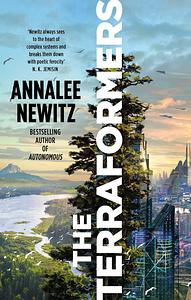Take a photo of a barcode or cover
adventurous
mysterious
reflective
tense
medium-paced
Plot or Character Driven:
A mix
Strong character development:
Complicated
Loveable characters:
Complicated
Diverse cast of characters:
Yes
Flaws of characters a main focus:
No
The narrator was good but also a lot, good pacing and voices but sometimes a bit steep jumping into heightened emotions when I thought there should be more build-up. The story is three separate narratives that are connected over centuries to previous events. It gets a bit harder to keep control of the characters as they move through these parts (moving from the Ranger who is pretty "normal" to a sentient train that changes bodies and drives the legal plot of the final act, plus their journalist robot cat friend?). I almost would have liked to have just the first part's characters through the whole book. It is an allegory for environmental degradation for private use and the disrespect of animals.
Good story - was recommended by Guardian Weekly.
The ending did wrap up a little quickly though.
The ending did wrap up a little quickly though.
adventurous
medium-paced
Plot or Character Driven:
Plot
Strong character development:
No
Loveable characters:
No
Diverse cast of characters:
Yes
Flaws of characters a main focus:
No
Annelee Newitz’s The Terraformers left me more disappointed than any book I’ve read in quite some time. While some novels can thrive without much plot by leaning on compelling characters (like Becky Chambers’ work), this one fails on both fronts. The characters are flat stereotypes, their relationships feel contrived, and conflicts arise or resolve purely to serve the author’s plot mechanics. Problems with obvious solutions are ignored until the narrative suddenly decides to address them.
The book spans three disconnected sections set in vastly different time periods, but the transitions between them are jarring, and the narrative doesn’t provide enough reason to care about the shifts. For example, in the first section, an underground city introduces itself to the surface world supposedly to address a water crisis. Yet, the issue is resolved entirely by the underground community and its magma-dwelling machine allies, leaving me wondering why this dramatic introduction was necessary at all.
The book is riddled with inconsistencies. In one absurd instance, an evil corporation attacks the underground city with satellites and lasers. Within 12 hours, the city somehow emerges victorious, with its inhabitants receiving high-end medical care and miraculously recovering from life-threatening injuries in time for a celebratory swim. This one battle, lasting roughly 90 minutes, is later grandiosely referred to as the “Eel River War.” Similarly, another corporation destroys a few buildings in its own city using orbital rail-gun strikes—wild overkill, given that each strike would resemble a tactical nuke.
Plot resolutions hinge on laughable oversights, like a corporate leader deleting a key section of a legal contract without reading it. The lack of basic competence strains belief, especially in a world where people have coffee-fetching robots but no legal review process. Such moments feel less like clever satire and more like lazy storytelling.
Geographical and temporal details are equally frustrating. A date is explicitly stated as June 21 but described as “late summer” just a paragraph later. Travel times are wildly inconsistent, whether it’s people hiking 700 miles through dense jungle in hours or flying moose taking anywhere from hours to days to cross the planet. Even sentient trains, which are said to take a week to traverse the continent, somehow do it in “four sunrises” elsewhere in the text.
The novel introduces intriguing ideas, like the concept of universal personhood (spanning humans, animals, and machines), but it never delves into them meaningfully. Why are some animals, like alligators, excluded from personhood? The book doesn’t say. Other ideas, such as the “travelling herbivore problem,” are mentioned repeatedly as monumental achievements without any explanation of what they entail.
The public transit subplot, which centers on the creation of sentient trains, feels similarly underdeveloped. While the ethical ramifications of creating sentient beings for labor could have been rich territory, the protagonist reacts with an “uncomplicated joy,” glossing over the complexities entirely. This lack of depth typifies the book’s treatment of potentially fascinating themes.
One redeeming concept was the idea that losing parties in a community vote could request concessions from the winners. It’s a thought-provoking notion about balancing majority rule with minority rights, though its potential for misuse is clear and unaddressed.
Unfortunately, the writing itself felt juvenile. Insults are clichéd, emotional arcs are erratic, and characters fall in and out of love in implausibly short timeframes. Unnecessary sex scenes and dialogue straight out of amateur fan fiction only compounded the sense that this novel was poorly executed.
Overall, The Terraformers had the potential to explore profound questions about personhood, ethics, and community, but the clumsy execution, weak characters, and inconsistent storytelling made it a frustrating read.
The book spans three disconnected sections set in vastly different time periods, but the transitions between them are jarring, and the narrative doesn’t provide enough reason to care about the shifts. For example, in the first section, an underground city introduces itself to the surface world supposedly to address a water crisis. Yet, the issue is resolved entirely by the underground community and its magma-dwelling machine allies, leaving me wondering why this dramatic introduction was necessary at all.
The book is riddled with inconsistencies. In one absurd instance, an evil corporation attacks the underground city with satellites and lasers. Within 12 hours, the city somehow emerges victorious, with its inhabitants receiving high-end medical care and miraculously recovering from life-threatening injuries in time for a celebratory swim. This one battle, lasting roughly 90 minutes, is later grandiosely referred to as the “Eel River War.” Similarly, another corporation destroys a few buildings in its own city using orbital rail-gun strikes—wild overkill, given that each strike would resemble a tactical nuke.
Plot resolutions hinge on laughable oversights, like a corporate leader deleting a key section of a legal contract without reading it. The lack of basic competence strains belief, especially in a world where people have coffee-fetching robots but no legal review process. Such moments feel less like clever satire and more like lazy storytelling.
Geographical and temporal details are equally frustrating. A date is explicitly stated as June 21 but described as “late summer” just a paragraph later. Travel times are wildly inconsistent, whether it’s people hiking 700 miles through dense jungle in hours or flying moose taking anywhere from hours to days to cross the planet. Even sentient trains, which are said to take a week to traverse the continent, somehow do it in “four sunrises” elsewhere in the text.
The novel introduces intriguing ideas, like the concept of universal personhood (spanning humans, animals, and machines), but it never delves into them meaningfully. Why are some animals, like alligators, excluded from personhood? The book doesn’t say. Other ideas, such as the “travelling herbivore problem,” are mentioned repeatedly as monumental achievements without any explanation of what they entail.
The public transit subplot, which centers on the creation of sentient trains, feels similarly underdeveloped. While the ethical ramifications of creating sentient beings for labor could have been rich territory, the protagonist reacts with an “uncomplicated joy,” glossing over the complexities entirely. This lack of depth typifies the book’s treatment of potentially fascinating themes.
One redeeming concept was the idea that losing parties in a community vote could request concessions from the winners. It’s a thought-provoking notion about balancing majority rule with minority rights, though its potential for misuse is clear and unaddressed.
Unfortunately, the writing itself felt juvenile. Insults are clichéd, emotional arcs are erratic, and characters fall in and out of love in implausibly short timeframes. Unnecessary sex scenes and dialogue straight out of amateur fan fiction only compounded the sense that this novel was poorly executed.
Overall, The Terraformers had the potential to explore profound questions about personhood, ethics, and community, but the clumsy execution, weak characters, and inconsistent storytelling made it a frustrating read.
A millennium-spanning book about ecology and the power of empathy. The world built by Newitz is detailed and rich. The book contains many technological leaps that the reader must go along with. It's not the tech that makes the book endearing, though, it's the well-drawn characters. Narration by Emily Lawrence is crisp and clear.
There are some interesting ideas being played with here, but there’s also a great deal of absurdism and what I would call satire, which are things I’m not overly fond of.
This was the most inoffensive almost kawaii look at genocide I've ever read. Which is a very uncomfortable thing to feel, but also, I'm not offended? I am in a cozy but atrocious recursive cycle.
CONTENT WARNING:
Things that were good:
-The terraforming. The actual "what do we have to do to prepare the planet for more life forms" part was neat.
-Animal buddies! Who DOESN'T want to be friends with a flying moose?!
-Feel good look at feel bad things. You at least won't be sad!
Things that I didn't like:
-How can you feel good about feel bad things? I don't know, man. I'm not sure I'm really interested in cozying up with extreme capitalism and slavery? The dissonance of just being alive in a world that relies on mega corporations is already a pretty precarious part of being a human. More was not really what I wanted.
-Illogical. Sigh. That's not how contracts work. That's not how real estate works, that's not how medical experimentation works etc. etc. etc. I get it, it's fun to make corporate overlords who "own" people, but in a world where real corporate overlords actually do own people, let's make it make sense, you know? Make it add up. Show me the work in worldbuilding that got us here. That actually goes for everything going on in this book, not just the slavery, although that's the yuckiest part.
-Really a collection of novellas. Which is fine, but it did feel like different books rather than episodes in the world. I found it disjointed.
I think perhaps the worst thing I can say about a book about huge social wrongs is that I felt nothing from it. And I think the nicest thing I can say about this book is that I have no ill feelings. So...it's okay.
CONTENT WARNING:
Spoiler
genocide, slavery, animal cruelty, xenophobia, medical experimentationThings that were good:
-The terraforming. The actual "what do we have to do to prepare the planet for more life forms" part was neat.
-Animal buddies! Who DOESN'T want to be friends with a flying moose?!
-Feel good look at feel bad things. You at least won't be sad!
Things that I didn't like:
-How can you feel good about feel bad things? I don't know, man. I'm not sure I'm really interested in cozying up with extreme capitalism and slavery? The dissonance of just being alive in a world that relies on mega corporations is already a pretty precarious part of being a human. More was not really what I wanted.
-Illogical. Sigh. That's not how contracts work. That's not how real estate works, that's not how medical experimentation works etc. etc. etc. I get it, it's fun to make corporate overlords who "own" people, but in a world where real corporate overlords actually do own people, let's make it make sense, you know? Make it add up. Show me the work in worldbuilding that got us here. That actually goes for everything going on in this book, not just the slavery, although that's the yuckiest part.
-Really a collection of novellas. Which is fine, but it did feel like different books rather than episodes in the world. I found it disjointed.
I think perhaps the worst thing I can say about a book about huge social wrongs is that I felt nothing from it. And I think the nicest thing I can say about this book is that I have no ill feelings. So...it's okay.
DNF. I gave it the good old college try but gave up on page 170 when I was forced to read this sentence against my will: “soon they were in the outskirts of the city, where low-density ranch homes and garden-shrouded castles formed an areola of habitation around the gigantic erect nipple of downtown”.
Also- I just cannot get past the fact that this takes place in the year 59,006 where we don’t bat an eye at multiple genetically engineered flying moose but folks are still out there eating cinnamon toast and almond butter?!
Also- I just cannot get past the fact that this takes place in the year 59,006 where we don’t bat an eye at multiple genetically engineered flying moose but folks are still out there eating cinnamon toast and almond butter?!
I liked a lot about this that I already liked about „Autonomous“ - the big ideas, in this case about terraforming and personhood. But I got distracted by skepticism about the long lifespans that are needed to make the story work and the big hole of boredom the book falls into in its middle section.
I am still on the fence about the novel‘s very utopian presentation of progressive politics, all of which I support, but which sometimes feel so … lame when you read about them. I don’t mind enviromentalism, sex positivity or people introducing themselves with pronouns, but the ending especially makes such a cheesy, didactic case against hypercapitalism and for democracy, that it deflated a lot of the book for me. There must be more subtle, more personal ways to get these ideas across.
I am still on the fence about the novel‘s very utopian presentation of progressive politics, all of which I support, but which sometimes feel so … lame when you read about them. I don’t mind enviromentalism, sex positivity or people introducing themselves with pronouns, but the ending especially makes such a cheesy, didactic case against hypercapitalism and for democracy, that it deflated a lot of the book for me. There must be more subtle, more personal ways to get these ideas across.




